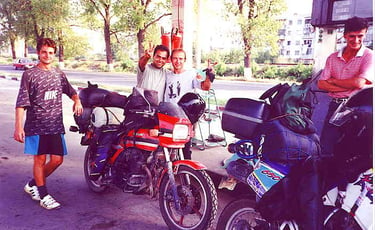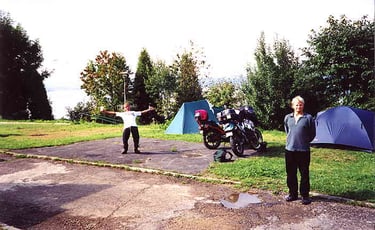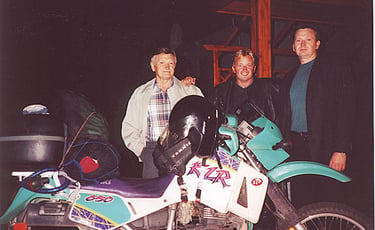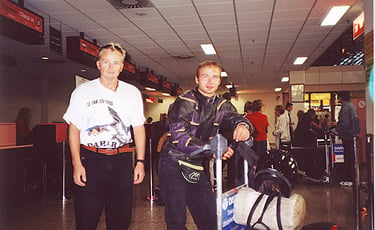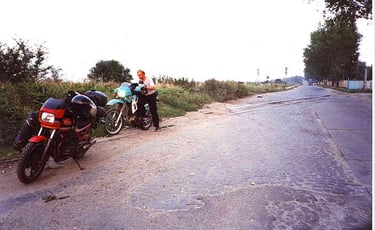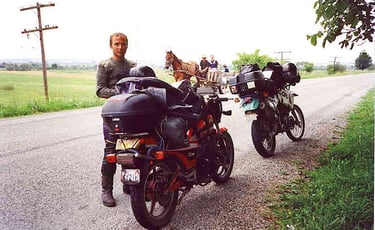GREG AND JACEK TRAVEL TOGETHER
1999
POLAND TO ISRAEL
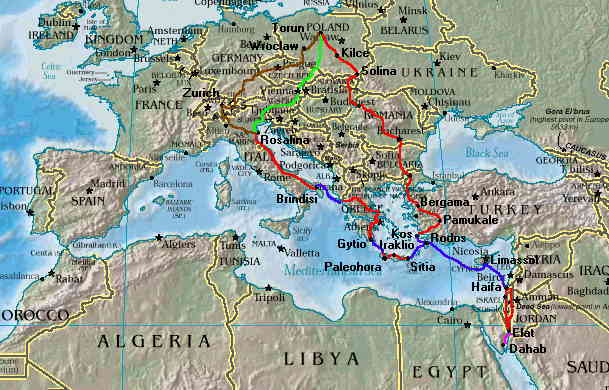

PREPARATIONS
G.: We returned from our '98 trip totally overwhelmed. It seemed like nothing could surpass our experiences but a trip to South America. Still at the moment it wasn’t realistic. I truly planned to give myself a break and stay in Canada for the summer of ’99. Yet, I couldn’t resist the temptation and in the fall of ’98, without making any serious plans, I purchased my bike. It was a good all rounder, a naked 1983 GPZ 550 in a very nice condition. Since Jacek was too hot to travel, it wasn’t difficult for him to convince me (if someone wants to do things, I am first to accompany).
The plan was to conclude our Mediterranean experience. That meant we would go to Greece, Turkey and Israel. We had several plans how to get to Israel and back.
Plan 1: Poland to Turkey, Syria, Jordan, Israel and back by boat to Turkey. We soon learned that if we wanted to do so Jacek would have to get his Israeli visa in Jordan, which was too risky. We also found out that there was no boat from Israel to Turkey.
Plan 2: We would take a boat from Turkey to Cyprus and from Cyprus to Israel. This plan wasn’t going to work either. So what there are boats to all these destinations if no one can cross the border between Northern and Southern Cyprus and no Turkish boat would go to Southern Cyprus.
We had to stick to the most common route, which was Greece (Athens or Rodos) to Limasol, Cyprus, to Haifa, Israel, and back. Since it would be a crime to be in Israel and not to visit Dahab again, we decided to do so. This time we didn’t have to do a lot of phoning, faxing and all this stuff. Jacek only needed a visa to Israel, which after a few problems and refusals was finally issued.
In May ’99 we started doing thorough tune-ups and we bought some parts, mainly new tires and brake pads. We also arranged a shipper. This time we chose a Polish company, since we wanted to send our bikes directly to Poland. We used the same crates we built for '98 trip.
In the mean time Lucas was also getting ready. He arranged all his visas to the Middle East and was to leave for Paris at the end of June. He was to ride south through Italy, take a ferry to Greece, and then he would take another ferry from Athens to Israel. The plan was to meet somewhere on the way. Unfortunately the plan was never realized.
STATISTICS
June 19/July 1 - August 31 1999
Countries visited: 13
Continents visited: 2
Kilometers:
road 10,000 (Torun to Torun)
sea 2,500 (8 ferries)
Motorbikes used: 1995 Kawasaki KLR 650 (teal) (Jacek) and 1983 Kawasaki GPz 550 (red)
Equipment failures/problems 1983 Kawasaki (Greg's)
none
Equipment failures/problems 1995 Kawasaki (Jacek's)
gear shifter and handle bar bent after a fall on railroad tracks in Romania - first one fixed on the spot, second one replaced in Poland at the end of the trip
Around US $350 spent on gas (each bike)
Pictures taken: around 400
EUROPE
POLAND
Greg: Saturday—Tuesday, June 19—July 6, 99: Poland
G.: I left for Poland on June 19, 99, Saturday. In London I changed planes. There I met an intoxicated Pole with whom I chatted and who offered me a drink of whiskey. It was my first time flying with PLL LOT (Polish Airlines) and first time at the Okecie Airport in Warsaw, small but very pleasant station.
I haven’t done any backpacking for a very long time so I decided to try it again. Next two weeks I spent traveling by train and visiting my friends and family.
Since my family lives all over southern Poland I had a chance to take many trains and buses. The public transport was very reliable and extremely cheap. It was also pretty easy to meet people on trains and even make friends (well, it was easy for me, I speak Polish).
Anybody I met worth mentioning? Yes. A Polish biker with whom I corresponded by email. He did some serious traveling, too. (Visit his site: go to Links and click Travel to Kenya or Travel to Tunisia).
I also met a Polish/Australian fellow on the train to Torun (he was reading a Lonely Planet book so I interrupted him and …).
When we arrived in Torun I invited him downtown for a beer. We chose the famous leaning tower of Torun as our place of conversation.
Jacek: Thursday, July 1, 99—Tuesday, July 6, 99: Toronto—Torun, Poland
J.: No more getting early to go to work! Vacation time!!!
I arrived in Poland on Friday. The flight was boring, so won't talk about it. My brother’s friend, Krzychu Bromka, picked me up at the airport and drove to Torun, my hometown. He, as most of Polish drivers nowadays, didn’t bother respecting speed limit: 200 km/h in 90 km/h zone. My parents and my brother welcomed me warmly.
Greg's and my bikes were supposed to come on Friday, July 2. They didn’t. When travelling, always be prepared to be late... In the meantime I enjoyed my family and my old friends from high school. Czesc, chlopaki i dziewczyny z IVB. Pozdrawiam - Jacek
Wednesday, July 7, 99: Still Torun
J.: I changed my image. Cut my long hair!
Finally something was going on. Three days late, the bikes arrived on Tuesday. Greg showed up on Tuesday night.
Wednesday’s events were quite interesting. First of all, we experienced post-communist bureaucracy. We waited 3,5 hours to see a Polish customs official. After a 2-minute conversation, he granted us permission to use our motorbikes as tourist vehicles (he was a biker, too). At the end of our visit there, another official suggested that it would be nice if we brought something to drink for the office. Well, let me tell you. He didn't mean mineral water. In order to avoid any upcoming problems we did as he hinted. I asked: "How many 'drinks'?" "Well... there are two motorcycles..." By the way, (and this has nothing to do with the incident I just described), a ½ liter bottle of vodka costs about US$ 5. Not bad, eh?
We got to the warehouse to unpack and put our vehicles together.
There weren't any problems except that we had to pay extra for storage (1 day) even though the bikes were late. According to what we were told in Toronto (from where we shipped the bikes), this charge was supposed to be around 5-10 bucks. It was 50 each! The company with whom we shipped the bikes (EuroCan Cargo Services) advertises itself as the most trustful and honest. I have a different conception of honesty.
G.: Here I have to thank Jacek’s father for driving us everywhere and Jacek’s mom for delicious meals and sawing my sleeping bag.
J.: Yes, thanks, mom and dad. Nevertheless, we had our bikes, and would be leaving my beloved hometown soon: Thursday or Friday.
Thursday, July 8 ’99:
J.: Torun
J.: Greg left on Thursday in order to visit his aunt in Wroclaw and then his sister in Switzerland. We were supposed to meet in Chioggia, Italy, on Monday. I decided to leave on Friday morning in order to visit my brother in Italy (on vacation).
G.: Torun-Wroclaw.
G.: It was a long and wet ride (Torun-Wroclaw). Only 350 kms but it took me 6 hours to make it. It rained all the time, many cars, slow trucks. Passing was the only way to go. Police attempted to stop me on two occasions (speeding) but I decided it was too dangerous to stop. It was a difficult and exhausting ride.
CZECHIA AUSTRIA
GERMANY SWITZERLAND
Friday, July 9, 99:
G. in Wroclaw.
A day of final preparations, checking every part on my GPZ and making sure it all works.
J.: Torun—Bobrava
I set off on Friday around noon, rode through Poland and stopped in a motel in Bobrava, Czech Republic, for the night. The clerk in the reception suggested that I should keep my motorbike inside the room to avoid theft. I’m sure my bike appreciated this gesture.
The disco was cheap, beer too. Czech girls beautiful and fun, as always.
Saturday, July 10, 9
G.: Wroclaw-Au by Zurich.
The longest ride of my life and also the best time I ever made. I rode 1150 km in 11 hours maintaining a cruising speed at 140-160 km/h. I crossed 4 borders, gassed up 3 times, ate 2 times, met some German bikers and truly enjoyed the ride. Beautiful mountains, great weather (15-20 C, dry), fantastic highways (Germany). I arrived in the evening and was very happy to see my sister. She had some more guests who stepped by on their way from Italy to Poland. So on Sunday we all had a wonderful time eating, drinking (Italian wine), talking and walking by the Zurig lake.
J.: Bobrava—Venice
The drive was interesting and picturesque. Unfortunately, it was raining all day so I wasn’t able to admire all the views.
ITALY
Sunday-Monday, July 11-12, 99
J.: Venice, Padova
I stayed with my brother and his family in Chioggia near Venice for two days. Czesc Wojtek, Iwona, Maciek i Jedrek! On Sunday we paid a short visit to Padova.
On Monday I went to see Venice by myself. Beautiful place!
Greg joined me in the late evening on Monday. He was coming from Switzerland.
G.: Au- Chioggia by Venice
One of the most picturesque rides. The Swiss Alps are simply breathtaking. The rigid and towering yet very inviting mountains always overwhelm me (naturally it was not my first time). Riding through a tunnel may sound like fun and it is if the tunnel is short. St. Gotthard was 18 kms long and after a while it was hard to breathe. When I left the tunnel I was very pleased with the sudden change of temperature. It was definitely over 25C (at least 10 degrees more than before the tunnel). Now I felt my vacation truly started. It is surely more fun riding in warm weather.
A quick ride through Northern Italy and that evening I joined Jacek and his brother in Chioggia.
Tuesday, July 13, 99: Chioggia—Brindisi
G.: From now on we rode together. I had to slow down a bit to ride with Jacek modestly at approximately 130/h. It’s OK, at this speed my GPZ was taking only 4.5L/100kms, major savings considering the European gas prices, 1$US per litre.
J.: Come on, I got a dual-purpose! And there is no reason to hurry. I prefer to save time by getting a bit early and by spending less time preparing breakfast and in the john ;-)
The weather now began to look more Mediterranean. No more rain! We took the expensive Italian highway. It paid off because we got to Brindisi around 9:30 p.m. and were able to board the 10:00 p.m. ferry for Igoumenitza, Greece.
While still on the highway, I lost the toll ticket. Somehow I got away paying the same amount as Greg (US$ 30), not the expected fine which would have been around $US 100. On the ferry there was plenty of room and certainly a cabin was not necessary. We found a cozy place in the lounge: soft benches and a table—truly a perfect place to crash. The trip took about 10 hours.
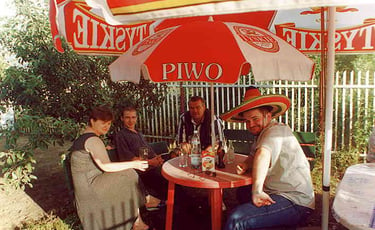

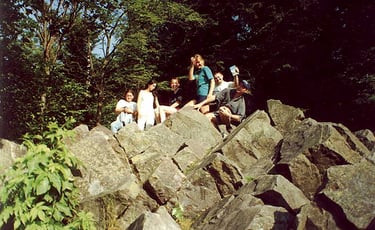

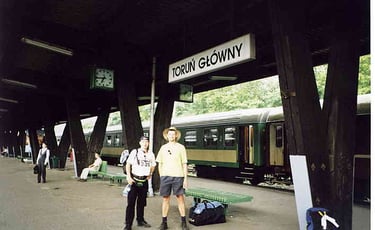

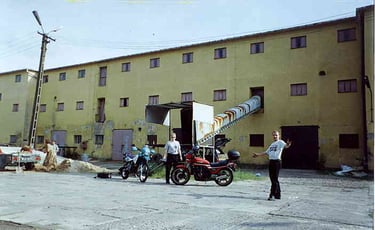

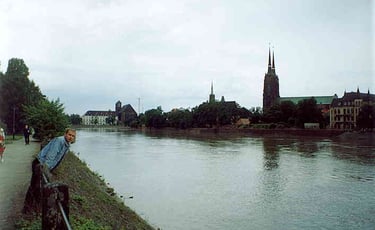

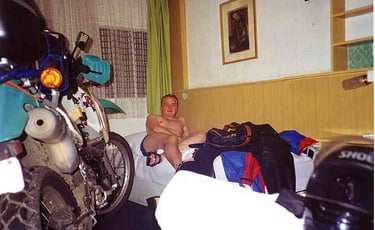

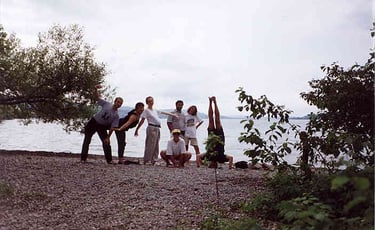

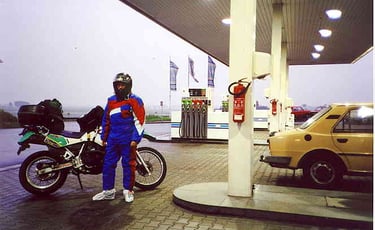

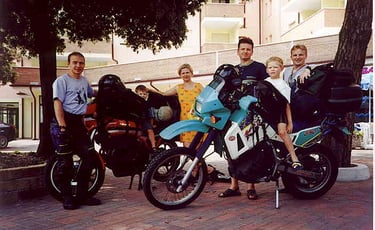

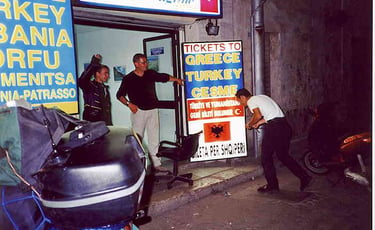

GREECE
Wednesday, July 14, 99: Igoumenitsa—Meteora
G.: We arrived in Igoumenitsa around 9 a.m. It was nice to see the port again. It did not change much since ’96. We withdrew some cash, ate some Greek cheese mmmmm… feta…), gassed up and off we went.
J.: The first experience of Greek mountain roads was exciting and fun.
Average speed for the day: 50 km/h: lots of turns and twists. The weather was great. Few times my outside thermometer displayed 40C. We crossed the Katara Pass.
Meteora
G.: Seeing the steep and smooth slopes of the mountains of Meteora was breathtaking. As if it wasn’t enough, there were monasteries on top of almost every mountain. Gee…. all these monks… How did they get there? Curious and fascinating.
At the campground we found many tourists and groups from different countries, including Poland. It was a must to say hi to our comrades. We were invited to dine with them but since they were mostly elderly people we sort of skipped it. There was a group of 20 or so English speaking young people camped beside us. Their behavior intrigued me. It seemed like their activities were very well planned. They did everything together. Later they sat in a circle and either prayed, meditated or discussed something very quietly. Strange. It looked like the AA meeting (I guess it was not).
The French on the other side seemed to have a lot more fun and beer and wine.
J.: At night in Meteora it was 35C. I like this type of whether. Warm… The chirping of the cicadas made the night “pleasant” and almost impossible to sleep.
Thursday, July 15, 99: Meteora—Athens
J.: In the morning we visited the monasteries in Meteora.
G.: Since the footpaths were not sign-posted, naturally we got lost. But once we climbed to the top we knew where we were. Two Americans came along. I think at some point they panicked but when we found the right path they quickly caught up with us. It really was not necessary to visit all the monasteries. Essentially they were all very similar inside, so we saw only two. The views from any of the tops were stunning. The mountains looked like they were drawn by a cartoonist. I couldn’t absorb everything. It was so different from anything I saw before.
J.: We set off to Athens around noon. The road from Meteora to Athens was very good.
G.: Good road but “not so good” pavement on one of the gas stations. The concrete floor was so slippery I could slide 10 meters on it. There Jacek survived his first ever fall on the hard surface. It was enough to slightly accelerate and the bike slid off to the side. Fortunately Jacek displayed a lot of "electricity in his ass" (some call it skill) and he quickly jumped off the falling bike. Long discussion with the gas bar attendant (mostly sign language) followed the incident. Finally the rider of the all and powerful KLR overcame his emotions and we rode off. Ironically, the gas station ran out of gas.
J.: The highway toll was cheap—US$ 1,5. We pitched our tent in Shinias right on the Ionian See, 30 km from Athens. There were lots of Greek families at our camping. It’s true that the mainland belongs to Greeks and the islands—to foreigners.
Friday, July 16, 99: Athens
J.: A bit disappointing. The only interesting spot in Athens is Acropolis.
You can see it in about 3 hours. The rest of the city is a modern metropolis. We walked around the downtown area visiting numerous souvenir shops.
On our way back to the camp, we came across a church fair.
G.: It was some kind of an orthodox celebration. Priests stood at the church entrance in their fancy and richly ornamented robes and recited holly passages while all the people listened. Around the church and particularly on one of the streets there was a long chain of stalls with every imaginable item. It was a good opportunity for all souvenir and memorabilia vendors to make a “buck” or rather a drahma. It was a very busy and colorful event.
J.: Right after that, we found a beach bar with life music. They played very good salsa and other Latino-American music. To our surprise, the beer was awfully expensive: US$ 10! I guess that covered the band as well. Later we found out that it was a private party for employees of some kind of wealthy company. So, the customers were rather rich. Most of them spoke good English. In the bar I met some Polish tourists (very young). They had just arrived at the camp and they were going to stay there for 2 weeks! What can you possibly do for two weeks on the beach and not get bored?!
Peloponnese
Saturday, July 17, 99. Athens—Nafplio
J.: It was a short ride. On the way we stopped at Pireas and Corinthos. In Pireas we were supposed meet my friends (Ania, Ewa, Pawel - the captain) who were sailing around Greece on a hired boat. Unfortunately we missed them.
G.: It was my first time going south on the Peloponessus. Red ragged mountains were the feature here. We arrived to Nafplio in the evening. The city and its setting were just beautiful.
A positive first impression made us decide to spend an evening in town. We quickly set up on a nearby camping and returned to get a glimpse of the Greek nightlife. Saturday was supposed to be the busiest evening and indeed it was. It seemed like young Greeks from all over came here just for the evening. We walked around, looked, had a few beers, tried to mingle and looked again. Naturally we tried to make some kind of connection with Greeks but honestly it was not that easy. Greeks love their language and they are rather reluctant to make contacts with foreigners. Oh well… tough luck… At least we saw how they partied.
Sunday, July 18, 99. Nafplio & Mycenae
J.: We spent another day in Nafplio. It was a beach day
as well as an educational day: we visited the ancient site of Mycenae.
The plan was to stay in Nafplio and its vicinity for a few days. According to the Lonely Planet book, the ferry to Crete to be on Wednesday. Out of curiosity, we asked a travel agent. It appeared that we could catch the ferry the next day in the afternoon.
Monday, July 19, 99. Nafplio—Mystras—Gythio—Kissamos
We left for Gythio early on Monday to catch the early afternoon ferry. More fun mountain roads followed.
We stopped for few hours to visit another set of ruins. This time it was the medieval town of Mystras.
CRERE
J.: Before we boarded the ferry we purchased food and drinks for the trip in a local supermarket.
The Ferry from Gythio to Kissamos stopped on two islands for no more than 2 minutes. Two people got off, two got on, and that was it!
We arrived in Kissamos around 1 a.m. It was too late to find a camping site. We opted for free accommodation. This time it was an olive tree orchard by an escarpment a few hundred meters from the seashore.
Tuesday, July 20, 99. Kissamos—Paleohora
J.: A relaxing day. Beautiful ride from Kissamos to Paleohora. It was quite an inexpensive place. A travelers hangout: we met German (hi, Sarah and company), Dutch and Polish backpackers (czesc Marta i Kacper,). We found an internet place in Paleohora but decided not to pay US$ 10 for an hour.
Wednesday, July 21, 99. Samaria Gorge
J.: We got up at 5:30. We left our bikes at the camp and took a bus (2½ hours of curves and twists) to Xyloskalo, place at the top of the Samaria Gorge). From there we walked down the Gorge for 6 hours. Beautiful and exciting place
G.: The place was full of tourist. Sometimes we had to wait in a line to get through a tight spot or an overpass. At the bottom we got to a village to which you can get either on foot or ferry. Warm.
Thursday, July 22, 99. Paleohora—Iraklio
J.: The ride through Crete was fun – lots of mountains.
Greg’s mattress was leaking so he bought a brand new one in a supermarket in Iraklio. To his disappointment, the new one was also leaking. Someone affixed a price tag to it a stapler holes in the mattress. Always check the mattress before paying for it. Greg got really ticked off.
Knossos.
Even though it’s believed to be the place of the oldest civilization in Europe, the site was quite disappointing. It was very difficult to distinguish between original walls and those rebuilt by the English archeologist, Sir Arthur Evans. Two thumbs down, unfortunately.
We walked around Iraklio, had a nice meal in an outdoor restaurant in the heart of the city,
did some people watching and headed to our campsite.
Rhodes
Friday, July 23, 99. Iraklio—Sitia—Rhodos
J.: We got up at 5:00 to catch a ferry Sitia to Rhodos.
The ferry was quite pleasant. We entertained ourselves with a Greek beer, Mythos. It was nice to meet some Poles again. This time it was a young couple on island-hopping vacation (czesc, Kasia i Bartek). They taught us how to play this very popular Greek game, a pleasant time killer. We got to Rhodos after midnight and decided to sleep for free again. This time it was a paradise-like beach just few kilometers south of the town of Rhodos. We slept till 9, and there still was no sign of an owner of the deck chairs we used for the night.
Saturday, July 24, 99. Rhodos
J.: Finally we found a decently priced internet cafe. It was US$ 3,50 per hour.
Now we were stuck in Rhodos waiting to the ferry to Israel. This was actually good, because we could enjoy sunshine and nightlife in Rhodos.
We placed ourselves on a campsite in Faliraki. Nightlife in Faliraki was very British. British tourists were arrogant and wild, painfully wild. Broken beer bottles, garbage, and drunk British. Bars were loud. I think my hearing got damaged. The only English girls you could strike a conversation with were the hostesses who were trying to persuade male tourists to enter bars. Italians, Dutch and Germans on the contrary were great to have fun with.
G.: We actually met a group of Italian tourists right on our camping. They liked to have fun so we partied with them a bit. They all spoke some English and most importantly I had a chance to practice my Italian. I have not spoken so much Italian in 10 years or so.
J.: On a cultural note: we visited the medieval town of Rhodos with its fairytale-like buildings.
Sunday, July 25, 99. Rhodos
G.: While on the island we also visited the town of Lindos. In the past it had a similar role to Rhodos but the old town is now mostly in ruins. There I saw a BMW motorbike that looked almost the same as Junak, the bike I imported to Canada from Poland last year.
We also visited the Valley of the Butterflies. Millions of insects occupy the whole valley but they are actually colorful moths, not butterflies.
To get to remote places we used our bikes and in order to match up to other bikers and mopeders (mostly rentals) we decided to ride without helmets. Some might say “not a good idea” but really it was quite OK. You can’t reach high speeds anyway because your eyes will tear if you go over 60k/h even with sunglasses on. We tried the cool Greek biker look riding through town at night with sunglasses on…. Ohhh….yeah!
J: It was “cool” but I wouldn’t ever do it again. It was trying the fortune.
Monday, July 26, 99. Rhodos
J.: Beach time. Relax time. Party time!!!
CYPRUS
Tuesday, July 27, 99. Rhodos—ferry to Haifa
J.: The ferry to Israel was expensive : US$ 100 per person, US$ 75 per bike. Altogether we paid US$ 350 each.
G.: We were not too demanding if it came to comfort but this ferry had the worst conditions on deck of all, considering the distance the boat covered and the time one spent on it. Dirty, oily, smelly and loud environment. Luckily we managed to sneak inside and got ourselves some seats without paying extra. I guess, no one cared. It was very exciting to meet young native Israelis (Jews), very smart (J.: rather arrogant) and also extremely proud individuals. On the deck we met again Jeffrey, the cyclist we met on the other ferry (Gythio-Kissamos). It was a nice surprise.
Wednesday, July 28, 99. Ferry to Haifa (stopover in Lymasol, Cyprus)
J.: The question was, what to do during a 36-hour journey. There wasn’t much to discover after we walked the deck several times, so we just vegged out. During the stopover we went with Jeffrey to see Lymasol. Not an interesting place but it was worth to see what it was. We hit the internet café and later had lunch at a street food place.
G.: We met some very pretty Russian girls, accompanied by a very large man. The girls claimed to be dancers. Personally I think they were more than that… We proposed to take some pictures but they were reluctant to agree. One more picture on the harbor with Jeffrey and our visit in Cyprus ended. It was time to board the ferry again.
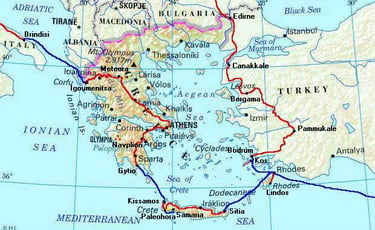

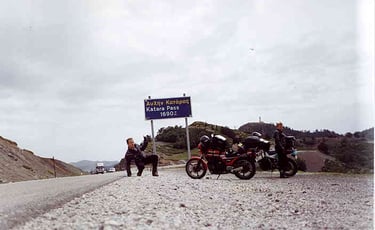

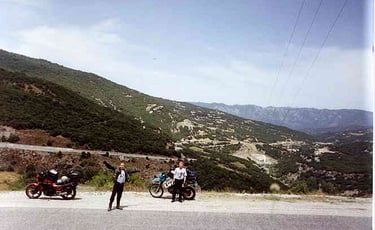

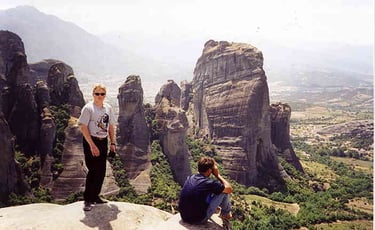

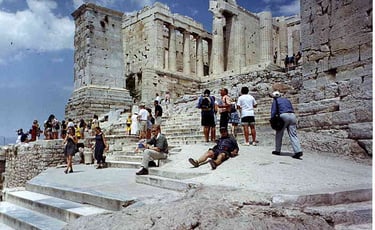

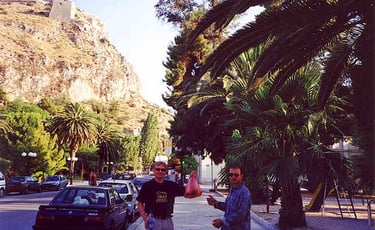

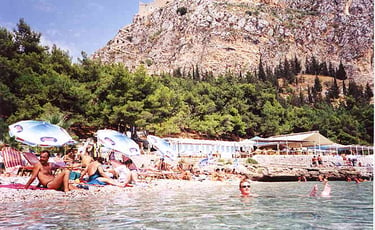

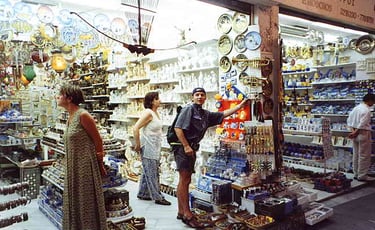

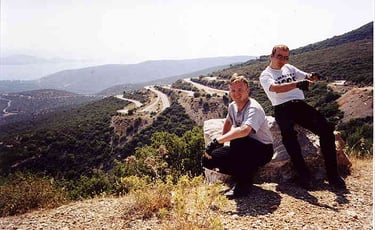

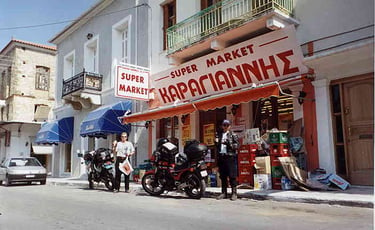

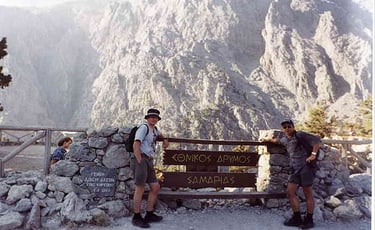

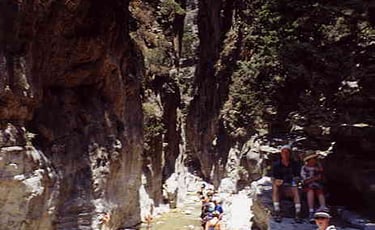

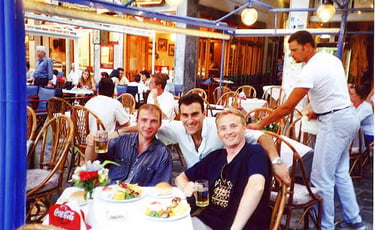

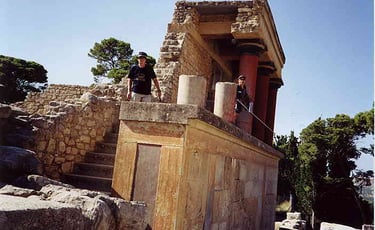

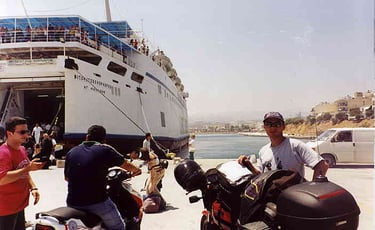

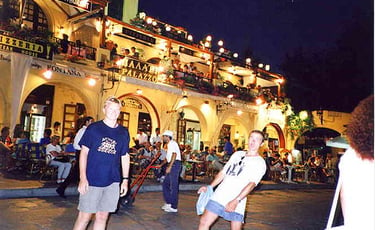

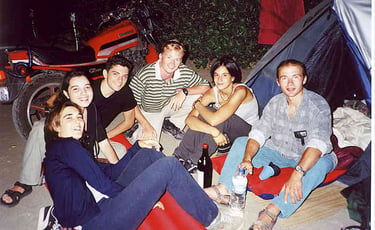

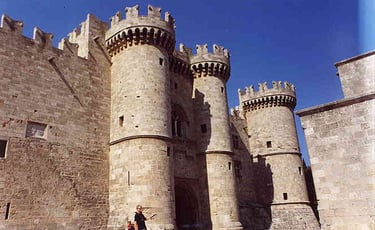

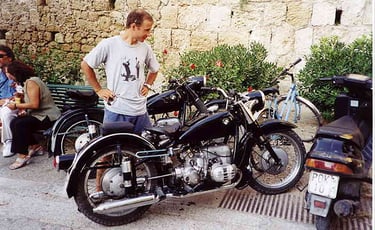

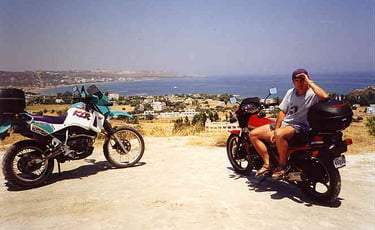

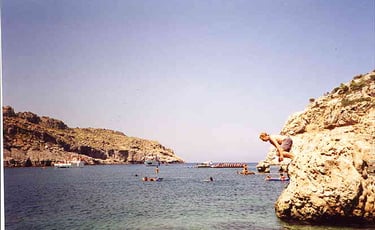

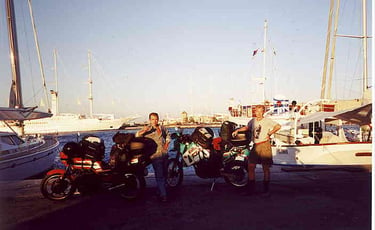

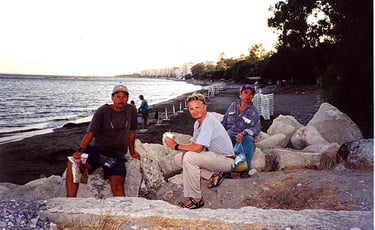

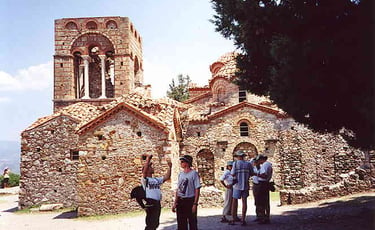

EGYPT AND ISRAEL
Dahab (Sinai)
Thursday, July 29, 99. Haifa—Dahab
J.: We survived through the Israeli customs. Greg didn’t have a Green Card (European vehicle insurance which applies also to Israel) and had to pay US$ 100 for it. Rip off. Then we drove straight south to Eilat (450 km). First impression of Israel was good: a developed country, modern roads, credit cards accepted at gas stations.
G.: On the way we passed through the newly developed town of Beer Sheba, right in the middle of the Negev desert. We got lost so we asked a passing woman for directions. I was totally stunned. She spoke Russian. She couldn’t speak Hebrew but claimed to be a Jew. We found out that a large portion of the city was populated by newly arrived Jews from foreign countries, mainly Russia.
Later, on the way to Eliat we saw a huge crater in the desert, the Maktesh Ramon. It was 300 m deep, 8 km wide and 40 km long. A cross between the Grand Canyon and Moon landscape.
It was nice to arrive at the bay of Eliat/Aqaba. Lots of divers, snorkelers, wind-surfers, a pure vacation spot.
J.: Crossing the Egyptian border was easy. However, there was a problem with our bikes: since we didn’t have the Carnet de Passage, the traffic officials didn’t let us drive our bikes into Egypt. We had to leave them on the border for a week. I tried bribing, but it didn’t work. The official felt offended by my offer of US$ 50.
On Egyptian side of the border we haggled over the price of the taxi. The most interesting was the quarrel between the taxi drivers over who was going to take us. At moments it seemed like it was going to get physical but really they just argued very loud. We took a taxi along with 3 Israeli tourists (66 Egyptian pounds—US$ 20 each). They were staying in 3-4-star hotel in Nueiba, we—in a camp (US$ 1,50 a night). Now I know what it is to be a backpacker. We had to carry half of our baggage on our back. We left the other half with the bikes.
We stayed in a Palm Beach Camp, the same one we visited last year. One of the bosses, Mohammed, recognized us! He also suggested a diving place for us, Penguin Diving Club next door. The hut we stayed in had a straw roof and straw partition walls. If you snored your neighbor wouldn’t appreciate it.
Friday, July 30, 99. Dahab
J.: That day we relaxed and started to study for PADI scuba diving course.
Saturday, July 31, 99—Wednesday, August 4, 99. Dahab
J: In the morning we met our charming instructor, Jennifer, a Californian. She would teach us to dive. There were four people in the group: Joop (a Dutch guy), Majken (a Danish girl), Greg and I.
For three days we had theoretical “classes” before lunch and practical after lunch: three hours or more in the water. We learned various techniques: taking the mask off under water, hovering, helping tired diver, taking bikini off a fellow diver, etc. Oh, sorry, the last skill wasn’t part of the course. Equipment was quite new, water warm—what else would one need?
We finished the course on Tuesday. The course was very strenuous. At the end of the day I was really tired, but happy at the same time. Even though the final test wasn’t easy, I got a perfect score. Diving hungry, we decided to buy two extra dives. The first dive was in the Blue Hole, the second one in the Islands. Along with the instructor we also got a pick-up taxi that drove us to those sites.
The Blue Hole is 80 meters deep. It is quite famous: every year there are several divers who die there. The most “popular” cause is misjudging depth of the dive. Nitrogen narcosis begins to occur around 40 meters under the surface. This is when a diver loses ability to estimate his/her position. At a certain point it is simply too late to inflate the BCD (Buoyancy Control Devise) and down he goes… (Mostly it's men who dive carelessly.)
The Islands diving point was amazing. Under the surface there are number of underwater “islands”.
It was easy to get lost but because the area itself was quite small, one could always emerge to determine the location. We came across a school of young barracudas. They had huge eyes and some kind of grace in their swimming. I approached them boldly. They weren’t afraid! For few minutes I swam among hundreds of them. Later on I read that the barracudas could be quite nasty and might attack people! Well, nothing happened to me.
If you go Dahab we truly suggest contacting the Penguin Divers Club. We were very happy with the way they handled the course and dives.
The food in Dahab was great. I loved local restaurants! You could have an outstanding and very fulfilling meal for 8-10 pounds (US$ 2-3). Our (Greg, Joop and mine) last meal was seafood: fish, calamari, shrimps, etc. Expensive (sic!)—about $5!
The only beer available in Dahab was the local Egyptian “Stella” which everybody called “camel piss”. The alcohol content did not show but it wasn’t more than 3%.
The food was so cheap that it was more economical to order breakfast than to fix one’s own by buying stuff from a store.
Our camp was placed right on the seashore, so when we were eating or resting we could enjoy the beautiful view across the Golf of Aqaba.
Egyptians who worked at our camp, entertained the guests with late night music performing on bongos and guitar plus singing. Rum, which is forbidden for Muslims, helped them find inspiration.
In Dahab, air was very dry during the day, but late in the evening moisture from above the Aqaba Gulf was swept towards the land that created stinking humid nights.
During shopping for T-shirts we came across a situation in which an Egyptian merchant refused to sell anything to an Israeli tourist. Some Arabs don’t really like Jews.
In Egypt, it was almost impossible to find a brand new or at least a decent looking banknote. All Egyptian money looked like used handkerchiefs. Greg came across a banknote taped over with electric tape.
Our host Mohammed knew two words in Polish: wielka tajemnica (great secret) so he called us that. He didn’t want to learn other words, though.
The great secret would resolve the next day: has anybody stolen anything from our motorbikes?
Israel
Thursday, August 5, 99. Dahab—Ein Gebi
J.: We left at 10 a.m. to Taba. The ride cost 25 Egyptian pounds a person (compare to 65 from Taba to Dahab!). The cab driver looked as if he just got off a camel.
On the border, the bikes were standing the way we left them a week ago. No one touched them!!! Even though some stuff fell off from under the fenders, nothing was missing. I respect Muslims for their honesty!
G.: One more time we had to go through the Israeli customs. I’m telling you, they are very meticulous. They think everyone is a terrorist carrying a bomb. Other than that, customs officials are very pleasant.
J.: It took three hours riding in hot desert air to get to Ein Gebi. I love desert!
Ein Gebi lies on the shore of the Dead Sea. According to the Lonely Planet guide, there should be a camping place. There was none. Which was good because we put our tent up anyway and saved few bucks this way. We met a solitary German tourist (police officer!).
Friday, August 6, 99. Ein Gebi—Massada—Tel-Aviv
J.: We took a dip in the Dead Sea (for the second time—the first time was last year on the Jordanian shore).
I didn’t like it. The feel of the water was disgusting. It smelled. And you could feel all the cuts you had on your body. There were people covering themselves in mud with some nutrients. For 10 IS you could buy a bag of mud from a guy who dug it.
There were some interesting gorges and waterfalls in the vicinity of Ein Gebi, but we decided to skip them. Instead we drove to Masada. In order to save few bucks (again!) we climbed the mountain of Masada (3/4 of an hour) instead of taking a cable car. It was quite an experience! Very hot and very dry! It took over two hours to see the whole place (including ½ hour rest after the strenuous hike).
We waited till the ticket window closed and then asked politely if we could use the cable car down. After contacting his superior, the attendant said yes!
After visiting Masada, we crossed sea level,
and went Tel-Aviv through the Palestinian areas. You could really see the difference between Jewish and Arab households. Arabs live poorly…
We got to Tel-Aviv around 6 p.m.—just on time for a beautiful sunset.
After finding a hostel and resting a bit, we went out in order to visit one of the famous Tel-Aviv discos. The following local makes of beers were available in Israel (could be purchased in a corner shop): Maccabee, Gold Star. Not bad. Imagine this: 1 a.m. on Sabbath night and there is almost nobody in the dance club! Why? Because the Israeli club goers begin to show up around 2 a.m.! Among a number of clubs we also came across a Russian Discotheque. I must say, Russian/Jewish girls are very attractive. It was getting very late though and we decided to end the night there. So, no disco for us! By the way: expensive cover charges: 10-20 US$. In the meantime I came across a woman who suggested to have “a good time” for 300 shekels (approx. 100$US). No, thanks. By the way, she had a Russian accent. Holy Land…
Saturday, August 7, 99. Tel-Aviv
J.: Our hostel was inhabited mostly by foreign workers from Slovakia, Czech republic, Poland, Romania, etc. In the reception there were sings of the following content: "Make sure you get paid every day"; "Never believe a word they say"; "Never believe they are your friends"; etc. It seemed that some of the foreign workers had really bad experiences with the local employers. So it seemed.
In the morning we attended Tel-Aviv’s beautiful beach with fine sand. The beach was packed. It was Sabbath.
In the afternoon we went to Jaffa, the old part of Tel-Aviv.
Sunday, August 8, 99. Tel-Aviv—Jerusalem
J.: We left Tel-Aviv in the morning for Jerusalem. After finding a hostel we ran through the Old City.
By an accident we met Joop, our diving partner from Dahab, and his current co-traveler, a Moroccan girl from France.
The most confusing thing in Jerusalem was what language to use. Should you say thank you in Arabic (shukran), Hebrew (toda), English, Armenian (?) or Russian? When to use Russian is quite easy: if you see a blond girl, say Spasiba.
In comparison to other Middle Eastern medinas we saw last year (Cairo in Egypt, Fes and Marrakesh in Morocco, Tunis in Tunisia, Aleppo and Damascus in Syria) Jerusalem seemed to be quite modern
Israel’s development since 1949 has left a strong mark on the Old City.
A visit to the Western Wall was impressive. On his entry to the “chapel” just to the left off the Western Wall area, Greg was asked for money contribution and whether he was a Jew. He didn’t donate any money.
Other very impressive places we visited were the Church of the Holy Sepulchre and the Mount of Olives.
Monday, August 9, 99. Jerusalem
J.: Another day of running around Jerusalem. Miracle: we were ready to see places as early as 9 a.m.! We visited all the famous places we didn’t visit the previous day. Greg was using his camera with telescope and as results we had quite interesting close-ups. Luckily we came across some kind of celebration. I believe young Jewish boys celebrated the 13th birthday—they were becoming men. Very exciting.
We hooked up with two cool girls from Vancouver: Emily and Anne. With them we did some sightseeing,
then had a romantic dinner in a fancy restaurant. We finished the evening in a small park just beside the Old City walls with a bottle of wine.
Tuesday, August 10, 99. Jerusalem—Bethlehem—Tiberias
J.: The next day, it was very difficult to get up (especially for Greg). We said bye-bye to Emily and Anne, and left for Bethlehem.
Bethlehem was shockingly different. It was an Arab town. We found people living there sad and gloomy. It was a different country—Palestine. Everything was less expensive than in Israel. I suppose that people make much less money too. Government doesn’t support this area at all. Looks like the government expects that this area will have to go back under Arab rule soon. It’s quite interesting that in the West Bank it seemed that there were no Jews. So why does the Israeli state keep this area as a part of Israel? Poverty and mess. …
We visited the birthplace of Jesus and later on the Mount of Temptation.
The road down the valley near Bethlehem had lots of sharp turns and no room to escape from other cars. I like that!
We proceeded to Tiberias. We stopped at the monastery of St. George beautifully located in a difficult to get to gorge.
Tiberias is called a Sweat City for a reason. Incredible humidity interferes with sleep. We checked out few hostels. All except one were full. The owner placed us in a closed restaurant. It was air-conditioned. Yeah!
Finally we decided to taste kosher food. Nothing special, just regular beef with salad and fries. The waitress was a blond very attractive Jewish girl from Russia. We stroke a conversation in Russian. I asked her how was her life in Israel. She said so-so, but hoped it was going to improve. She just came to Israel 2 months ago and hardly spoke Hebrew.
Wednesday, August 11, 99. Galilee & Golan Heights
J.: We got up early and made a tour around the Galilee and the Golan Heights. We met a lot of Christian pilgrims. We visited Mountain of Beatitudes, Church of the Multiplication of the Loaves and Fishes, church of the Primacy of St. Peter, and Capernaum.
The Golan Heights themselves were bald, but valleys bloomed with beautiful fertile orchards. In the middle of the road we met an Israeli couple on a motorbike! They were born and raised in a kibbutz. That was our only contact with the kibbutz people. The couple had had a problem with their motorbike.
Greg fixed the bike on the spot: they just ran out of gas and it was enough to lean the bike over to one side so that gas would pour from one chamber of the gas tank to the other.
G.: Military presence was visible in the West Bank.
Very often (not only in the Golan Heights but essentially everywhere in Israel) we saw people carrying weapons. Were they members of the army? Were they carrying them for safety? In Tiberias we saw a young civilian perhaps 18 year old carrying a 4 feet long gun. I guess he was a member of the army in civvies.
J.: When we came back to Tiberias, there was no room for us in the hostel. The owner was expecting a large group of Israeli travelers. We got kicked out! We decided to sleep on the lake shore. Pleasant temperature of 32 C. Jewish beer Gold Star helped us forget about the safety and we quickly fell asleep. Two pros of this decision: saving few bucks, and seeing sunrise over the Sea of Galilee.
Thursday, August 12, 99. Tiberias—Akko—Haifa—ferry to Rhodos
We got up early in order to visit the city of Akko. We were tired and ready to rest a bit on a ferry. We took about an hour to see old part of the city.
Last stop in Haifa. One week was just enough for quick tourists like us.
G.: We stormed a cheep supermarket and stocked up on some food and drinks. Eh! Two nights and one day again on a ferry, one may get bored and a bit hungry, got it?
In front of the store we generated a bit of attention and started conversations with some international Jews: me with a Spanish Jew and Jacek with a Russian Jew. We found out that Jews from different countries did not like each other much.
J.: We found that in Israel everyday courtesy was non-existent. People looked at each other with some kind of indifference mixed with hostility. Store attendants were not friendly. Even the Lonely Planet guidebook admitted that it was not that Jews had bad manners. They had no manners at all! The book was not far from truth.
The border procedure was quite simple. The security officer conducted an interview with us. No one has ever asked me so many detailed questions. What was the name of the hotel? Whom did you meet in the hotel? Where did you go then? Did you meet anybody on your way from the restaurant to the hotel? Etc….
After about half-hour on deck, we sneaked down to the Pullman seats area. Again, we didn’t buy any extra tickets. The ferry tickets were expensive anyway, so forget it! There was 36 hours of boredom ahead of us.
Friday, August 13, 99. Ferry to Rhodos
J.: Let me give you some advice: don’t eat canned fish after it has been exposed to high temperatures for a week. I got sick like a dog.
We met two Slovaks coming back home from a 9-month long stay in Israel. They were working, illegally of course, for the past 9 months. During their stay, they didn’t find Israelis very friendly. On the ferry there was also an Italian couple, Monia and Fabiano, whom we met on our way to Israel two weeks back.
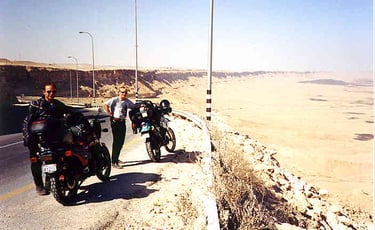

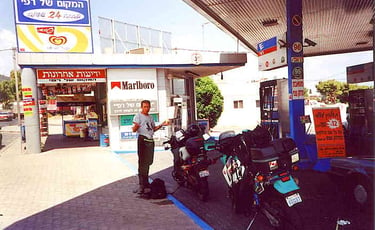

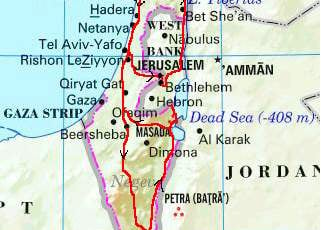

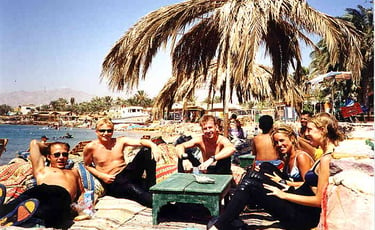

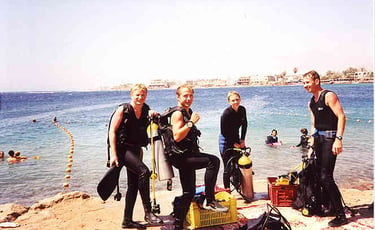

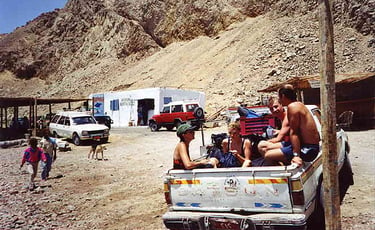

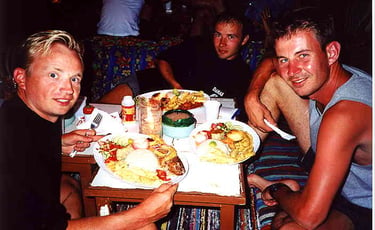

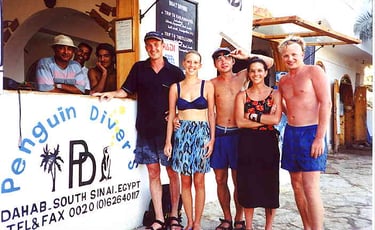

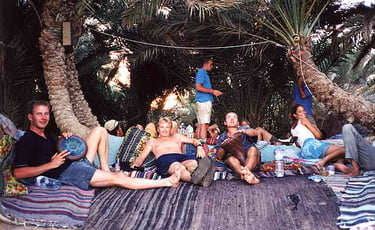

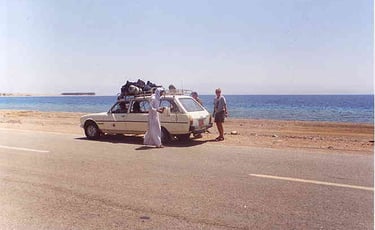

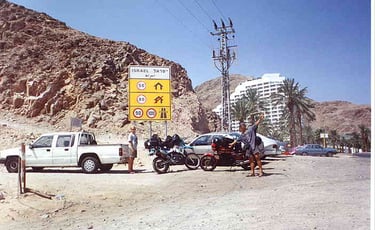

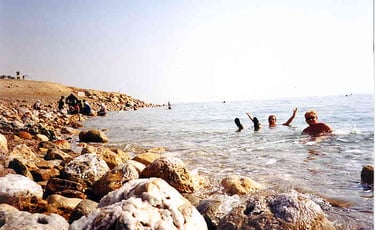

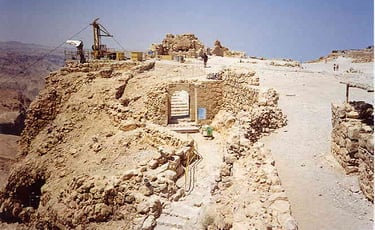

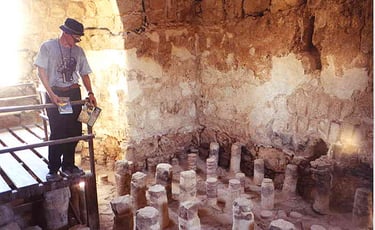

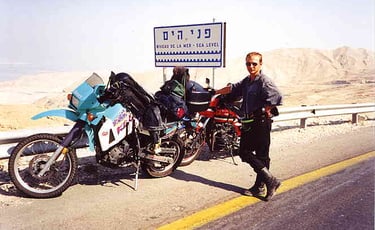

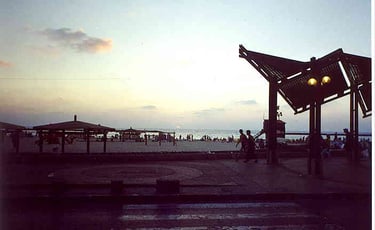

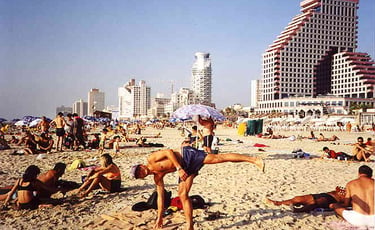

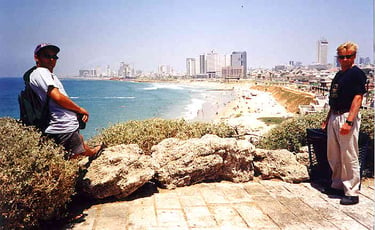

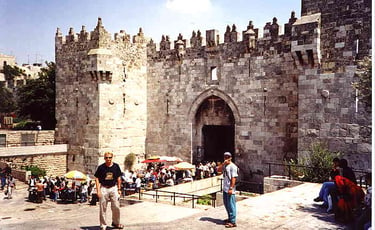

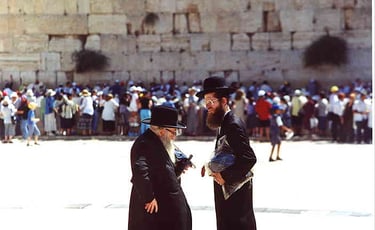

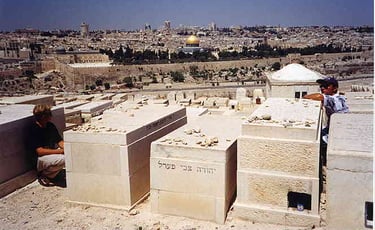

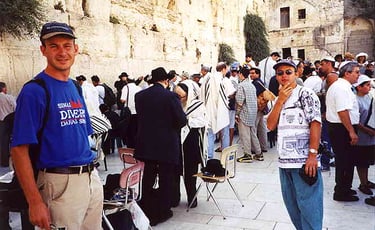

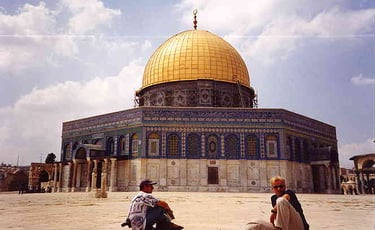

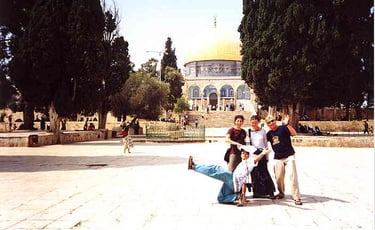

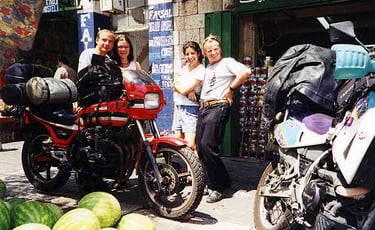

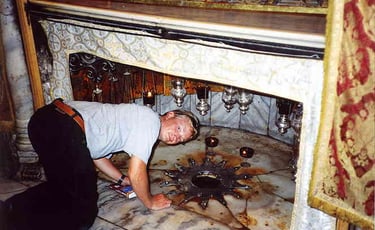

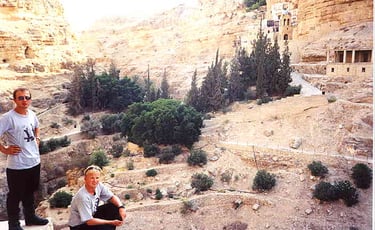

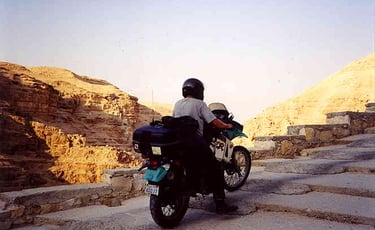

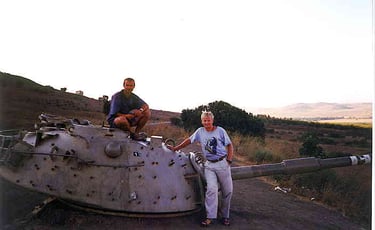

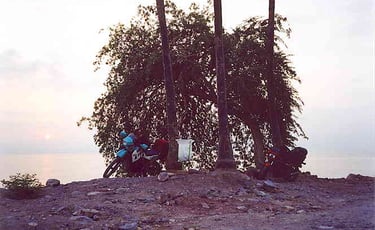

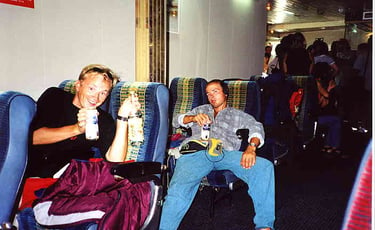

TURKEY
Kos (Greece)
Saturday, August 14, 99. Rhodos—Kos
J.: We arrived in Rhodes in the morning and spent the whole day on the beach waiting for the ferry to Kos. The ferry ride itself was interesting because we were travelling along the shore. Kos was much smaller and friendlier than Rhodes.
Sunday, August 15, 99. Kos
J.: The island was occupied by Scandinavians—great people to party with. Yeah! The nightlife was just what the guidebook described: fun and busy. It was quite easy to find a secluded beach and simply enjoy the sea.
Turkey
Monday, August 16, 99. Kos—Bodrum
J.: Because of low traffic between Turkey and Greece, the ferry Kos—Bodrum was the smallest we took this year: it fit three cars, two motorcycles and 20 people. $90 each! For a one-hour ride! A rip off.
In Bodrum we camped at the same place as last year. This year it was much less busy. The season was coming to the end.
Tuesday, August 17, 99. Bodrum—Pamukkale
J.: In the morning we found out about the earthquake in the Istanbul area. Not knowing the extent of the disaster, we thought: oh, well, another attraction. We kept riding to Pamukkale.
Pamukkale presented similar hassle to the one we had experienced in Morocco last year. There were three guys on mopeds chasing us in order to get us to their hostels. The most persistent guy who also had a swimming pool by his hostel won! One night: 1,000,000 Turkish lira a person which equals about US$3. The owner was very nice. His wife was preparing meal for the guests. Delicious!
Pamukkale is famous for its white calcium formations set on the side of the ridge. From far away it looks like snow.
Coming closer you could see shallow pools filled with warm, calcium-rich mineral water. Because the place has been a popular resort from Roman times, there is lots of ruins to be seen.
Beside the hostel there was a swimming pool with warm water coming down from the mountain. Food was cheap. Overall great place to enjoy.
Wednesday, August 18, 99. Pamukkale—Bergamo
J.: That morning we were supposed to head to Istanbul. At that point there were 2,500 victims. Eventually, the number of dead was close to 30,000. There was no electricity, no water, no gas in the area afflicted by the catastrophe. We changed our plans and decided to go to Bergamo (Latin name: Pergamum). Second time in a row I was going to miss Istanbul. Well, that means that I would have to come back to Turkey again. The road from Pamukkale to Bergamo was agriculturally rich. Imagine a valley approximately 100 km long and 30 km wide full of ripe grapes.
Our last ancient ruins this year, Pergamum, was famous for its king who invented pergamen, a writing surface made from animal hides rather than pressed papyrus reeds. There used to be a huge library reaching around 200,000 books.
In the evening we went to a Turkish bath (hammam). In comparison to hammam in Damascus, Syria, last year, this one was of much lower class: quite dirty and the stuff didn’t offer any tea at the end!
Thursday, August 19, 99. Bergamo—Edirne
J.: Another pleasant ride. Another ferry (across Dardanelles Strait).
Another night for free—this time in the middle of the stubble field. The plan for Friday was to reach Hungary.
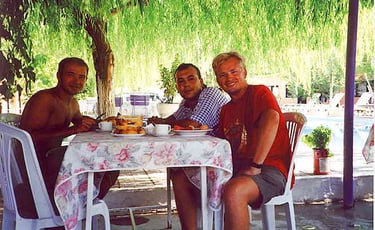

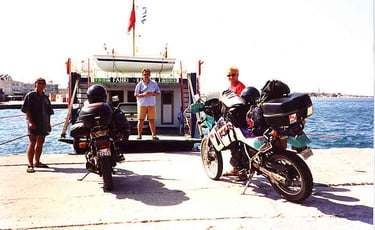

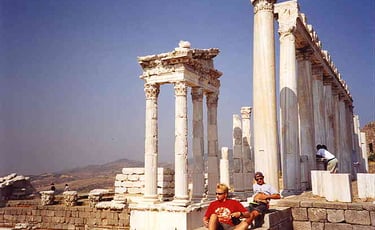

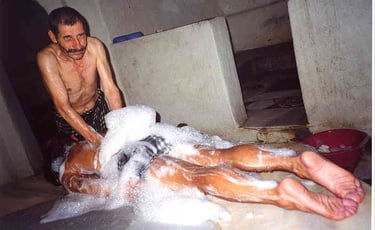

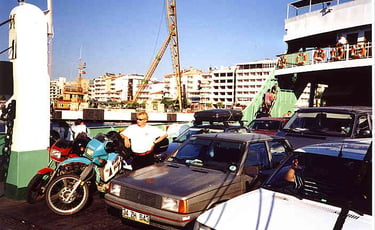

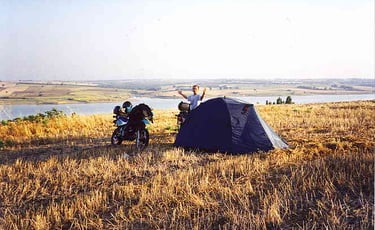

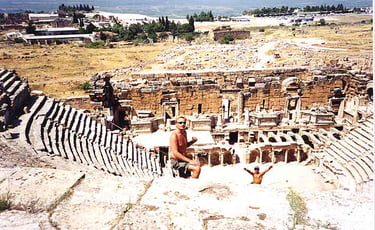

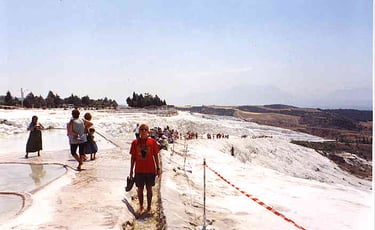

EUROPE
Transit: Bulgaria, Romania, Hungary, Slovakia
Friday, August 20, 99. Edirne—Bulgaria—Romania
J.: Crossing Bulgaria and Romania in one day?! Impossible! Bulgarian and Romanian roads are terrible. Last year we drove through Bulgaria, then took a ferry over the Danube River in Vidim. This year we were hoping to save some time by crossing Danube in Ruse (the only bridge). In Romania we stopped at a gas station.
People seemed to be very nice. You could really see that it was a very poor country.
Driving through Romania was horrible. The following incident and accident happened:
Romanian cops stopped us just before Bukarest. The officer claimed that we didn’t obey a flashing light for pedestrians 2 km back. Of course, that was B.S. He came up with a US$40 ticket for each of us. Finally he suggested (he “a good karakter” – his own words) a different type of a ticket — a bribe in the amount of US$10 each. When we refused he yelled at us that we were not cooperating and that he was going to hold on to our passports for a week. Well, we decided to pay. Crook!
The accident happened right after the experience with the cops. I was shaken and angry, the road was an old military track more suitable for tanks rather than cars, with tricky railway crossings almost every 500 meters. On one of the crossings I miscalculated my position and fell. Fortunately, my legs weren’t seriously injured. Handle bar got bent, so did the gear shifter. Bad luck and good luck at the same time. I could have ended up in a hospital.
Another night for free. This time in a corn field.
Saturday, August 21, 99. Romania—Kosice
J.: The next day we crossed Romanian/Hungarian border (another “hidden charge” for a Romanian officer – US$ 5 each), and Hungarian/Slovakian border. We reached Kosice in the evening. Pretty town, cheap and good beer, beautiful women. I wish we had time to stay longer there.
POLAND
Sunday, August 22, 99. Kosice—Solina
J.: We left Kosice in the morning, crossed the border and headed to Solina.
G.: Second time in a row we concluded our trip by the Solina Lake in Bieszczady Mountains, Poland, a spectacular place and a great hang out.
I hope to return there many more times. Since it was cold and it rained we decided to leave for Torun the next day.
Monday, August 23, 99. Solina—Torun
G.: On arrival we were welcomed by Jacek’s family
and served a hearty meal. In the evening we went downtown to meet friends we met last year, bikers too. We shared our stories, had some good Polish beer and made new friends. It was a nice conclusion of the journey.
Tuesday, August 24, 99—Monday, August 30, 99.Torun
J.: For a week each of us was trying to sell the bikes. Not so easy. First of all we had to pay duty. Greg got away quite easily. According to the Customs officer, the declared value of my bike was too low. After 3 hours of negotiations, the officer asked for 100 zl (US$25) as a thank you gift. It is old post-communist custom in Poland—you have to contribute to the guy’s new car.
I spent the rest of the week in Torun. Greg was visiting his family all over Poland. I left my motorbike in my brother’s garage. It would be sold in October for ZLP 9,000, which, after deducting duty charge, came down to around CAN$ 2,500. Not bad for a motorcycle with 49,000 km. Greg left his bike at his aunt's, and as far as I know, it’s still there, so if you live in Poland and want a bike, e-mail Greg: przepraszam@hotmail.com
Wednesday, August 31, 99. Flight Warsaw—Toront
J.: The trip ended. Greg and I returned safely home.
Big thanks for Greg for being a great travel companion.
To all those who never did anything crazy—the time has come. Don’t wait till you retire. Hit the road NOW!
EVERYTHING IS POSSIBLE.
